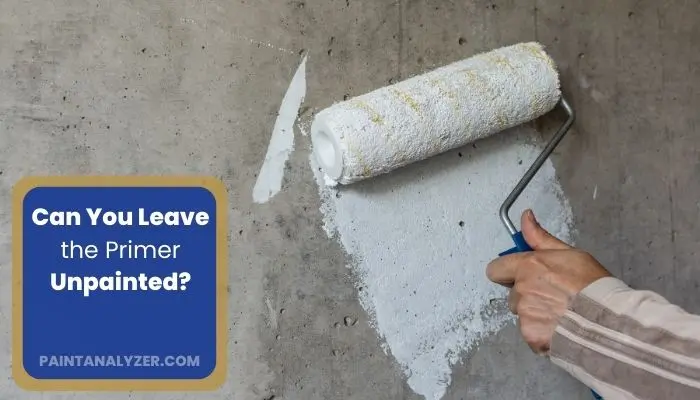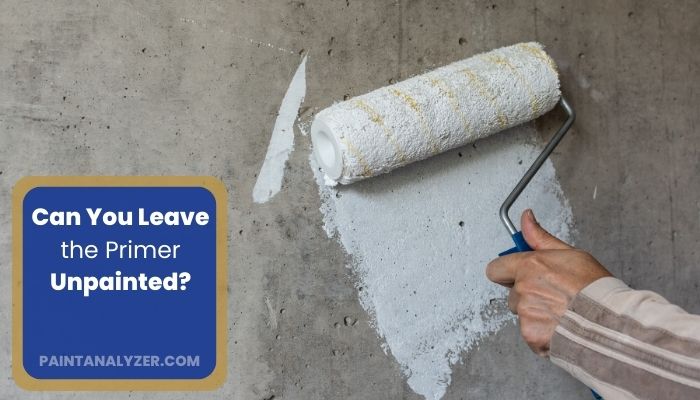When you think about painting your house, the first thing you probably think of is painting the walls. But what about the primer? You may be wondering if you can leave the primer unpainted.
While it’s possible to do so, it’s not recommended. Primer is designed to protect the wood beneath it and improve the paint’s adhesion, so skipping it can shorten the lifespan of your paint job.
Plus, paint won’t adhere as well to bare wood, so you may end up with an uneven finish. So save yourself some time and effort down the road by taking the time to prime your surfaces before painting.

What Happens If Primer Isn’t Painted Over?
Though it may not always be the case, it does happen frequently enough to raise some concerns.
The paint won’t stick very well to the object
The paint won’t stick to the surface as well if you don’t paint over the primer. As a result, it is more probable that the paint will flake, chip, or peel off.
The paint job won’t last as long
Without a primer, the paint is more likely to wear down sooner. This means that you’ll have to repaint more often, which can be a hassle and an expense.
The paint job won’t look as good
A paint job without primer won’t look as smooth or professional. The paint may also have a duller color.
You may waste paint
You might end up using more paint than you would have if you had used priming if the paint doesn’t stick adequately to the surface.
The surface may be damaged
The surface below might be harmed if the paint flakes, peels, or peels off. When you’re painting over something that is already in good shape, this could be an issue.
In short, not painting over primer is a bad idea. If you want your paint job to last, to look good, and to be easy to do, then you need to use primer. It may seem like an extra step, but it’s worth it in the end.
Can Primer Be Painted On Ceilings?
You most likely have a can or two of primer laying around in your garage or basement if you’re like most folks. You probably don’t know what to do with it once you’re done painting your walls. But did you know that primer can actually be used as ceiling paint?
Yes, it’s true! Primer is specially formulated to help paint adhere to surfaces, so it’s perfect for ceilings. Plus, it provides a nice, even base for your top coat of paint.
So if you’re looking for a way to get a professional-looking paint job on your ceiling, reach for the primer instead of the regular paint.
Is Primer A Paint Alternative?
It’s a common question – can primer be used as paint? The short answer is no. You cannot use primer as paint. Primer is designed to provide a smooth surface for painting and to help the paint adhere to the surface.
It also helps to block out stains and odors. Paint, on the other hand, is designed to provide color and protect the surface it is applied to. While primer and paint may both be applied to a wall, they serve different purposes and cannot be used interchangeably.
Is Primer White Paint Compatible?
There are a lot of painting projects that require white paint. But can primer be used as white paint? The short answer is yes. Primer can be used as white paint.
However, there are a few things to keep in mind if you’re going to use primer as your paint. They are typically thinner than paints, so you may need to apply more coats of primer to get the same coverage as you would with paint. They are designed to adhere to surfaces and create a smooth surface for painting, so they may not have the same finish as paint.
Some primers contain chemicals that could be harmful if inhaled or ingested, so it’s essential to read the labels carefully and follow all safety precautions when using them. It is a good option if you’re looking for an alternative to traditional white paint. Just make sure you take the time to prep your surfaces properly and apply enough coats for good coverage.
How much time may primer be left unpainted?
How long can primer stay unpainted? This is a common question with no clear answer. Most primers are designed to be left unpainted for up to two weeks, but this isn’t always the case. A few factors can affect how long your primer will last without being painted over.
Type of primer you’re using
Some water-based primers can start to degrade after just a few days, while others will last much longer. If you’re unsure how long your primer will last, check the manufacturer’s instructions or ask a professional.
The weather
If it’s humid or rainy, your primer may not last as long as it would in drier conditions.
Again, if you’re unsure, check with the manufacturer or a professional.
Clean the surface
It’s essential to keep your primed surface clean and free of debris. If there’s dirt or dust on the surface, it can shorten the lifespan of your primer.
So make sure to clean your surface before applying any paint!
Do You Have to Paint Over Primer on a Car?
You can technically leave primer unpainted on a car, but we wouldn’t recommend it. Primer is meant to be a base layer for paint, so without paint on top of it, the primer will slowly start to degrade and won’t protect your car’s surface as well. Additionally, it isn’t meant to be exposed to the elements like paint is, so it will likely start to chip and flake if left unpainted.
In short, painting your car is the best way to protect it from the elements and keep it looking its best.
Can Primer Be Left Unpainted? Complete Description These are the facts
Is it necessary to paint over primer or can it be left unpainted?
Once you’ve completed the step by step primer removal process, it’s not necessary to paint over the primer. However, leaving it unpainted may leave the surface vulnerable to damage and may not provide the finished look you desire. Painting over the primer will ensure a smooth and polished final appearance.
Conclusion
In conclusion, there is a lot of debate on whether or not you can leave primer unpainted. While some people argue that it is perfectly fine to do so, others contend that it is not a good idea. Ultimately, it is up to the individual to decide what is best for their project. If you are unsure, it is always best to consult with a professional.
Still, if you are confused, please feel free to ask in the comment section below or contact us. We will be happy to help you out!
